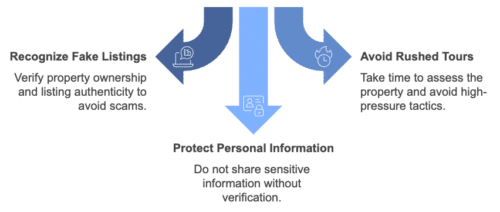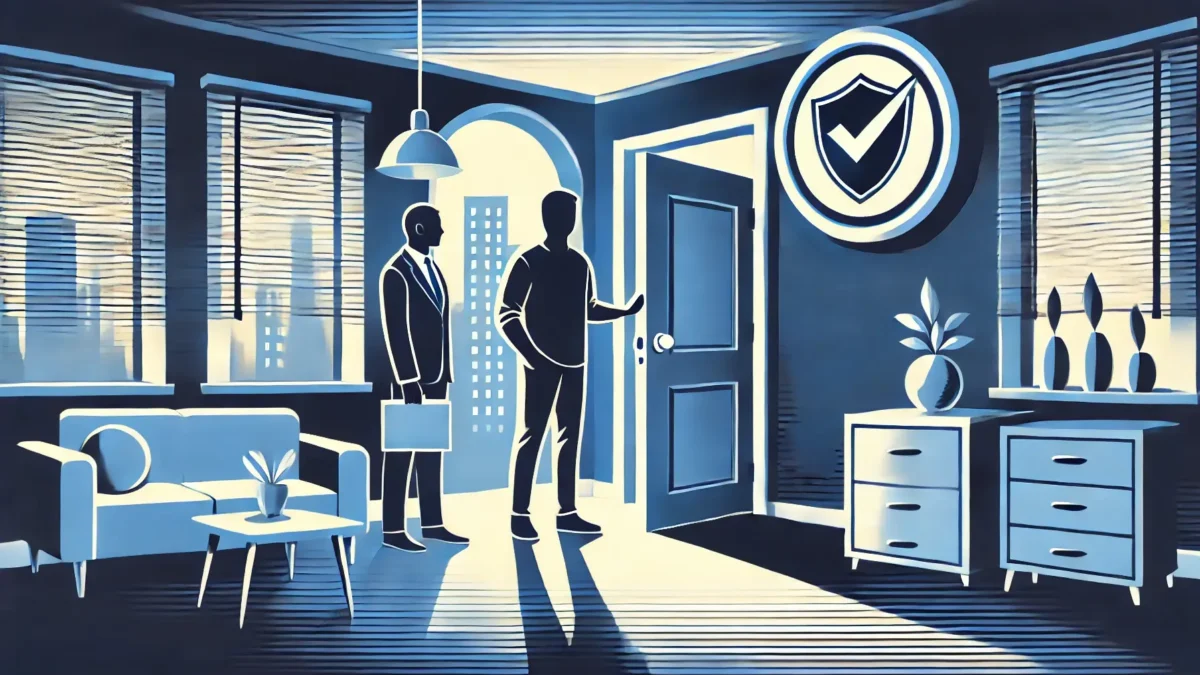
I’ve Been Scammed on a Housing Deal! What to do?
February 13, 2020
Is Rent-to-Own Too Good to Be True?
April 30, 2020In today’s rental market, scammers are targeting renters in many ways, including fake apartment tours. Here at Section 8 Shield, we’ve gathered insights from readers and looked at common reports from different U.S. states to help you stay safe on apartment tours. Here’s a comprehensive guide to help you avoid scams and protect yourself during your next apartment tour.
Why Apartment Tours Can Be Risky

- Fake Listings: Scammers sometimes list fake properties or even list properties they don’t own. Renters arrive for a “tour” and sometimes even pay deposits before realizing it’s a scam.
- Rushed Tours and High-Pressure Tactics: Some scammers rush through tours or push for an immediate deposit, often claiming other tenants are interested.
- Identity Theft Risks: During tours, fake landlords may ask for personal information like social security numbers under the guise of “pre-screening” or “background checks.”
What to Look Out For
1. Check the Listing Details
- Research the Address: Look up the property’s address online. If the property is listed on multiple sites with different prices or landlord names, be cautious.
- Use Trusted Platforms: Stick to well-known rental platforms like Zillow or Apartments.com. Be wary of listings on free classifieds or social media.
- Compare Rent Prices: If the rent seems too good to be true for the area, it could be a scam. Some scammers lure people in with unusually low prices.
2. Verify the Identity of the “Landlord” or “Agent”
- Ask for Proof: Request identification from the person showing the apartment. Legitimate landlords and agents should have no issue providing proof of identity and association with the property.
- Contact Property Management: If the property is managed by a company, call their main office to confirm the person’s identity.
- Cross-Check: Google their name or phone number. Many renters report scammers’ contact information online, so you may find reviews or scam warnings.
Red Flags During the Apartment Tour
1. Unwillingness to Answer Basic Questions
- If the landlord or agent dodges questions about maintenance, terms of the lease, or property ownership, consider it a warning sign.
2. Refusal to Show Certain Areas
- Legitimate landlords want to showcase the property to its full potential. If certain rooms or areas are off-limits, it might indicate something is wrong.
3. Pressure to Sign or Pay Immediately
- Scammers often create urgency, claiming many others are interested. Legitimate rentals don’t require an immediate decision on the spot.
4. Requests for Sensitive Personal Information Too Early
- Background and credit checks are common, but they’re usually done after initial interest. If the person asks for your Social Security number or banking details during or right after the tour, be wary.
Tips for Staying Safe During the Tour
| Bring a Friend or Family Member | Having someone with you can deter scammers and provide you with another perspective on the property and landlord. |
| Meet in a Public Location First | If you’re meeting a potential landlord or agent for the first time, suggest meeting in a public place nearby before heading to the property. This helps you gauge their intentions before the tour. |
| Use Your Own Transportation | Avoid accepting rides from landlords or agents. Arriving and leaving independently gives you control over the situation. |
| Carry a Basic Checklist | Prepare a checklist of items to review during the tour, such as: – Functionality of appliances – Condition of plumbing and electricity – Locks and security measures – General maintenance (e.g., no mold, water damage) |
Post-Tour Tips to Ensure the Rental is Legitimate
1. Research the Property Ownership
- Use your county’s public property records to confirm ownership. Many counties have online databases where you can search by address. Ensure the landlord matches the listed owner.
2. Don’t Pay Until You’re Sure
- Never pay a deposit or sign anything on the spot. Take time to review the lease, and if the landlord pressures you, it’s a red flag.
3. Avoid Cash or Wire Transfers
- Scammers often ask for cash, wire transfers, or prepaid cards as payment methods because these are harder to trace. Use secure methods like checks or credit cards.
4. Use a Lease Agreement Review
- Before signing any lease, have a legal professional or a trusted housing organization review the lease. This can help spot unusual terms or loopholes that scammers might exploit.
What to Do If You Suspect a Scam
1. Report It
- Report suspicious listings to the website where it’s posted. You can also file a report with your local police, the Federal Trade Commission (FTC), or the Better Business Bureau (BBB).
2. Warn Others
- Use online platforms like Ripoff Report, the BBB, or Reddit to share your experience and warn other renters.
3. Consider Scam Verification Tools
- Use platforms like Section 8 Shield’s Scam Verification Tool to check if the landlord or listing has been flagged by others.
Examples of Common Apartment Tour Scams
| Fake Key Scam | The scammer gives the renter a set of fake keys after receiving a deposit. The renter shows up to move in, only to find the keys don’t work or another tenant already lives there. |
| Bait-and-Switch Scam | The rental listing shows a beautiful apartment, but during the tour, you’re shown a lower-quality unit. Scammers use high-quality photos to lure renters, then pressure them into renting a less appealing place. |
| Phantom Rentals | Scammers post listings for properties that don’t exist. They collect deposits or fees from interested renters, then disappear without a trace. |
| Third-Party Scammers | A “friend” or “relative” is showing the apartment because the “real landlord” is out of town. Often, these are fake agents or middlemen who don’t represent anyone. |
Final Thoughts: Trust Your Instincts
If something feels off during an apartment tour, trust your gut. Scammers often try to create urgency and downplay any questions you may have. Taking a step back, doing some research, and using trusted resources can help you avoid falling victim to apartment rental scams.
Remember, Section 8 Shield is here to help you navigate these situations safely. Our tools, guides, and scam database are designed to protect renters and keep the housing market safer for everyone. Before your next apartment tour, review these tips and stay informed.




